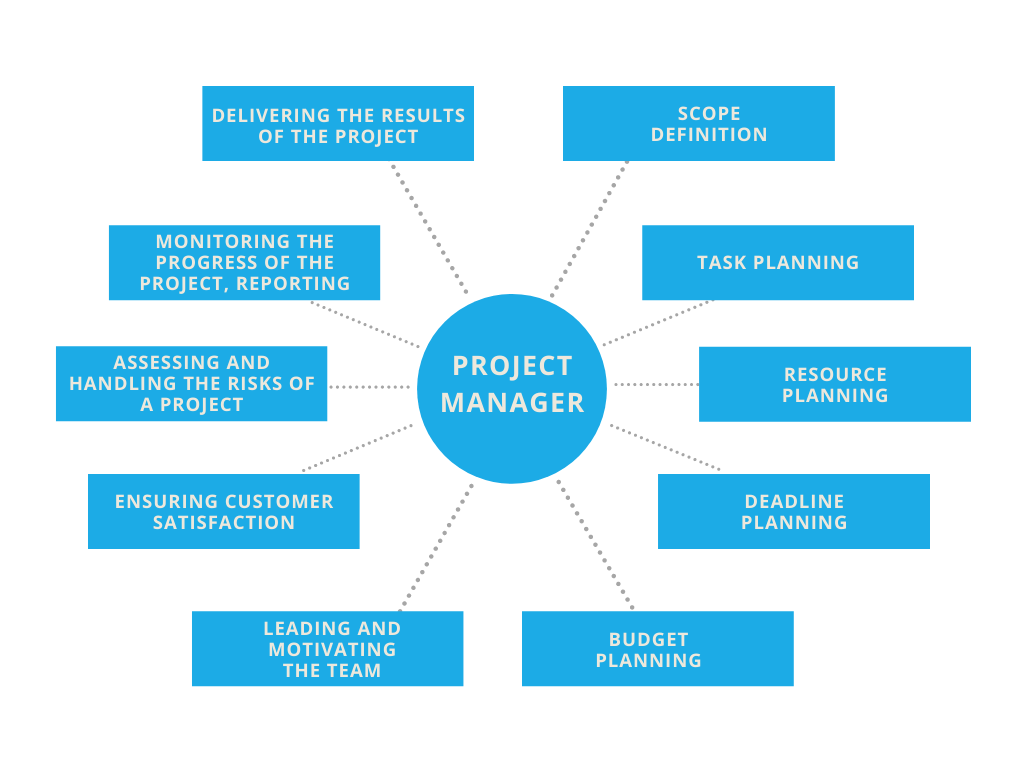What are the responsibilities of an IT project manager? What does it take to be a good project manager and how much can you earn in this job?
More...
Let's Start with the Basics!
What Exactly Is An IT Project?
According to Wiki, "In project management, a project consists of a temporary endeavor undertaken to create a unique product, service or result."
In the context of an IT project, this entails developing a custom IT product or IT service that will be delivered as part of an IT project.
The IT project plan includes a cost (budget) and a timeline. Both the supplier and the customer are aware of its purpose and deliverables (result products).
What Is Project Management?
Project Management is defined as the task and responsibility of ensuring the achievement of project goals. It accomplishes this by directing, organizing, and coordinating the project. In the case of IT projects, the IT project manager is in charge of the supplier-side project management tasks. Many projects may require separate client-side project management.
What Are The 10 Main Tasks Of An IT Project Manager?
An IT project manager's primary responsibility is to ensure that the project meets its objectives and that all project-related tasks are completed within the budget and time frame specified.

1. Scope Definition
It is paramount for an IT project to have a well-defined scope and to be clear about what its goals are, what the project team needs to achieve as the end result.
The scope sets the boundaries of an IT project, defining the tasks to be performed and excluding those that are out of scope.
For instance: when user training is part of the scope following the implementation of a new IT system, the project documentation must include the specified requirements and obligations related to the training. Without clear training requirements, it will not be part of the project scope.
To avoid any misunderstanding, it is crucial to highlight what is out of the project scope. Take the example above: If the project documentation states that training is not part of the project, then it is clear for every participant, that the team in charge of the project cannot be held accountable for training following the implementation of the system.
It is crucial to have a correct scope definition. As well as discussing it. If the client and the IT project manager are on the same page on what the project means and agree on the task list the team must do to complete the project and what is not part of it, the project is on the path to success.
Contrarily, if the scope isn’t well defined, and is interpreted differently by the parties, chances are the project will fail from the start.
Some projects don’t need to have a precisely predefined scope. In that case, it is important to choose the methodology adequately.
2. Task Planning
After discussing the scope, the IT project manager – preferably by including the project participants - defines the activities and the sequence that the team will perform during the project.
It is essential to have a detailed requirements specification to understand the tasks. Once you do, you are ready for planning the details. If you don’t, defining the tasks is only possible on a more abstract level.
We have arrived at one of the key phases of choosing the project methodology. Do we have to deliver results according to predefined requirements? Are the detailed obligations describing the end product not available yet?
For the first one, a prime example is an IT system used in public services. In this case, the source of the requirements regarding the system is the legislation. As a result, a classic waterfall model would probably be the best choice, because the requirements are obvious (in theory).
However, if the customer is not completely certain, does not know thoroughly how their system should work, using the agile model would work better. This gives the project enough flexibility to be launched without a detailed requirements specification and makes room for corrections and alterations along with the project.
3. Resource Planning
Following (or during) the task planning phase the IT project manager will allocate the necessary resources for each task. The resources usually mean the IT experts who will complete the tasks.
Best case scenario: the IT project manager and the participants (lead developers, system coordinator etc.) allocate the resources together in cooperation and it is not the sole job of the IT project manager
While planning the resources it is important that the IT expert responsible to undertake a certain task is skilled enough to accomplish the task and that their workload remains constant.
It is highly important to identify and include the key participants of the project. The more experts involved in a particular task (development, system coordination, or operation) during the project's planning stage, the more precise and well-planned the project will be. Furthermore, the earlier mentioned experts will feel more obliged to accomplish the objectives within the scope and time frame specified in the project.
4. Deadline Planning
After defining the tasks and the sequence in which the team will perform them, the next step is discussing the milestone dates and final deadlines. With correctly defined project deadlines the team will be able to deliver the product within the requested time frame. If not, it is time to re-plan the project.
Besides evaluating the amount of time reasonable for each task, the IT project manager has to take into account those tasks that are not part of the project. These include claiming the necessary documents from the clients, and the client acceptance procedures, etc.
5. Budget Planning
The budget of an IT project includes « expenses » and « incomes ». The « expenses » column comprises mainly the tasks to be performed and the cost of the resources allocated to them. On the other hand, the « incomes » column includes milestones where the completion of a part of the project comes with an invoice.
The difference between « incomes » and « expenses » gives the profit of the project. An IT project manager does not only have to ensure the on-time delivery of the final products but also that the overall financial objectives are achieved.
For this, the IT project manager needs strong negotiating skills because realizing yet another smaller demand from the customer that they describe as « should be included within the project », might in reality affect the results. The role of the IT project manager is to weigh what to include in the project budget and what to consider as a change request (CR).
The methodology used to accomplish the project is important. There is a great difference between accepting alterations when working on an IT project with a fixed budget (ex. in the case of a waterfall model) and accepting them when the budget is fixed but the tasks had been defined in a flexible manner.
6. Leading and Motivating the Team
The success of an IT project depends on the team and its leader.
As far as responsibility is concerned, the manager is responsible for the success of an IT project, but the success of a task depends on the individual participants of the project. For an IT project to be successful, you need a well-coordinated team. To build one of these is the mission of the IT project manager.
While leading an IT project, the manager can use many project management tools to ensure the successful delivery and closure of the project. They can include their coworkers in planning, delegate some key missions, or assign the tasks directly. They can complement the most efficient coworkers, give feedback on the progress of the project, motivate using a myriad of tools and if they really love the project, they can inspire the rest of the team leading by example.
7. Ensuring Customer Satisfaction
Behind a successful project, there are usually good customer relationships, agreements, common goals and objectives. The IT project manager has the role of ensuring all of the above. It is not an easy task as during the project the customer and the supplier might have some conflict of interests.
The customer’s interest is to include as much technical content in the project as possible and achieve the highest quality possible when realizing the project. The supplier’s interest is that the completion of the technical content and the available quality be in line with the budget. There is always a better technical solution, there is always a nicer design or screen, but the IT project managers’ hands are tied. Their job is to deliver a solution that fits the budget. Within that, however, they must deliver the best, the most desirable, and the most efficient product. By doing this the IT project manager usually guarantees customer satisfaction.
8. Assessing and Handling the Risks of an IT Project
Many risk factors appear during the planning and execution phases of an IT project. These might include poorly defined initial requirements, uncertainties regarding the customer or the development team, as well as having an inexperienced team member in the project or giving too much importance to a key participant. A too-tight budget or the potential unavailability of resources can also be a cause of concern.
The role of an IT project manager is to assess all the potential risks of an IT project, to organize and handle them, furthermore to inform those who are concerned.
9. Monitoring the Progress of the Project, Reporting
While implementing the project, the manager must ensure steady progress. They have to continuously monitor the evolution of each task, prepare the team for the upcoming tasks, ensure a successful delivery acceptance process and also handle the risks.
During the progress, the completion might face some obstacles. Overcoming these is also the job of the IT project manager. If to do so, others have to be included, the IT project manager has to speak up and escalate the problem.
In the early phases of the project, the stakeholders agree on the most important milestones. The IT project manager’s job is to periodically create and deliver progress reports to each stakeholder throughout the whole project period.
10. Delivering the Results of the Project
The role of an IT project manager is to deliver the results to the customer within the deadline and with the technical contents/quality established in the contract, as well as to have the customer confirm the completion of the project. If they manage to accomplish all of the above, and the project expenses didn’t exceed the budget, the IT project manager and their team did a good job!

How Can I Be A Good IT Project Manager?
If you want to be a good IT project manager, you have to be able to:
8 Reasons Why You Need an IT Project Manager
1. Plannability and Predictability
A good IT project manager works with a plan. No matter how good or bad the plan may be, and how it is handled by the IT project manager having a plan is certainly better than no plan at all, or having an IT project manager who does not monitor it.
2. The Quality of Deliverables
An IT project manager’s job is to handle the deliverables in accordance with the contract. This is where the parties have established what must be delivered and according to what conditions. Not many people check out the requirements in the contract. Except for the IT project manager.
A good contract comprises the quality requirements as well. If it does not comprise them precisely enough, it is necessary to discuss with the customer what they expect as deliverables exactly. The IT project manager has to be efficient in this kind of communication. They have to understand and handle the needs of the customer if they are significantly different from the initial requirements and if the customer and the supplier interpret the deliverables differently.
3. Handling the Budget and the Deadlines
These are essential tasks of the IT project manager. Without an IT project manager to lead an IT project, handling the budget and the deadlines get less important than it should.
A few months delay in an IT project can turn the entire project into a loss-making one, because the collaborators' salary might be really high. Therefore, it should be monitored and handled carefully. An IT project cannot be delayed indefinitely.
4. System Documentation
Given, that the IT project manager works from a contract, they handle the deliverables in accordance. Meaning that if the deliverables include system documentation (ex.: system design, operating documentation, operation manual etc.) they will ensure that the customer receives it during the project.

5. Handling Problems, Escalation
A good IT project manager tries to handle the issues that may arise during an IT project. Not only do they try to handle them, but ultimately, they find a solution as well. This process is very time-consuming and includes a lot of consultations and verifications with the customer or other participants. The IT projects where participants other than the IT project manager invest a considerable amount of time in resolving this kind of issue are rare.
6. Customer Communication
It is important in an IT project to understand the customer. This will require a business analyst or IT project manager. Not because a developer wouldn’t understand what the customer is saying, but because during a consultation with a customer, many questions might arise that require other skills than development.
For this, adequate communication skills, and occasionally a thorough knowledge of the contract is necessary.
7. Handling the Risks
Assessing and handling the risks is a very important task. The results of a good risk assessment are often completely invisible because we closed the project on time, didn’t we? Yes, we did, but how many risks have been identified and needed to be dealt with immediately by the IT project manager? Often it is impossible to know how many times they had to intervene, discuss and fine-tune things.
8. Team Leading
One of the basic rules in software development is that the team leader is not necessarily the most skillful expert. Could be on the contrary! Leading people does not only require IT knowledge but also management skills and experience.
A good IT project manager holds the team together, includes the team members in interpreting and planning the tasks, gives focus, leads, measures moreover shows the right way precisely just like a compass.
Typical Job Interview Questions in an IT Project Manager Job
Source: CareerVids - https://www.youtube.com/watch?v=MtcOcfmL0l0
How Much Does an IT Project Manager Earn?
Data updated: October 2022 (Hungary - Europe)
An IT project managers’ wage on average before tax depending on experience:
However, if you can acquire serious domain knowledge your wage could be a lot higher than these.
Check out the Main IT Roles in our blog post!
If you want to be the first to hear about our new blog posts follow us on Linkedin and Facebook!



